#mike altman
Photo
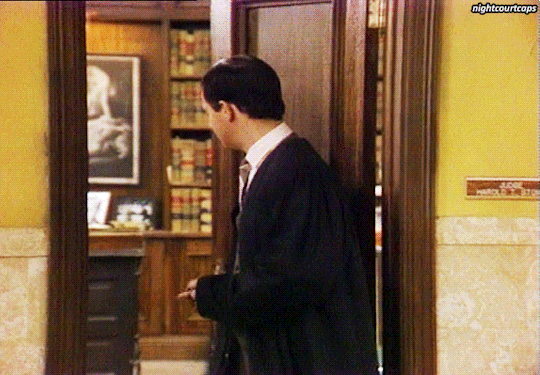
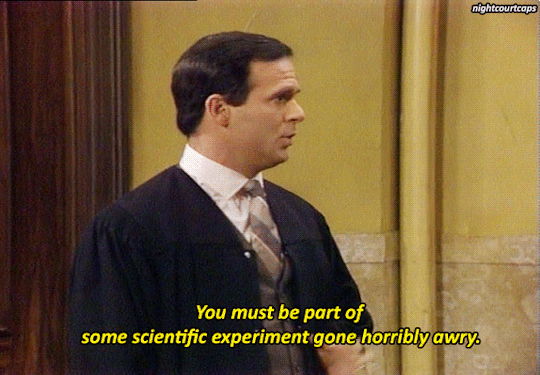


Night Court - The New Judge (S4-E7)
#mike watson#mac robinson#christine sullivan#dan fielding#roz russell#bull shannon#night court#s4#charles robinson#markie post#john larroquette#marsha warfield#richard moll#jeff altman#gifset#q
44 notes
·
View notes
Text
twitch_live
Radio Dead Air Tech Q&A tonight at 9pm ET!
Sam Altman is out as CEO of OpenAI and the reason may shock you! Well, unless you were here for crypto. Or NFTs. Or the metaverse.
We'll talk about it!

Send your tech questions to [email protected] and we'll answer them live!
4 notes
·
View notes
Text
Imagine you're 15 and your dad asks you to come up with some over the top emo lyrics for a song so you spend about five minutes on it and scribble something down and then he likes it so much he uses it as the theme song for his movie which is successful enough to inspire a TV show that uses the same theme song and they don't even use your lyrics but you still get half the songwriting credit and then the TV show runs for 11 years and gets rerun for the rest of time.
19 notes
·
View notes
Text
So, like, I somehow have the need to see Will Treaty and Will Byers meet for some reason. Anything will do, fic, drawing, ANYTHING. I’ll also be over here trying to draw or write some of that myself:>
I also need them, to literally just bond like a brotherly relationship, or like share trauma and comfort and then play D&D or share music tastes together and maybe Treaty can share Byers a song he’s played on the mandola(he’d definitely share graybeard Halt), whilst Horace and Mike discuss stuff that happen in their world, share information about their boyfriends in explicit and completely loving detail and maybe get a teensy bit jealous about how good their boyfriends are getting along with each other-
#rangers apprentice#will byers#will treaty#horace altman#hill#Byler#mike x will#Will x Horace#stranger things
18 notes
·
View notes
Text
0 notes
Text
My Top Ten and Bottom Ten New Watches of the Month:
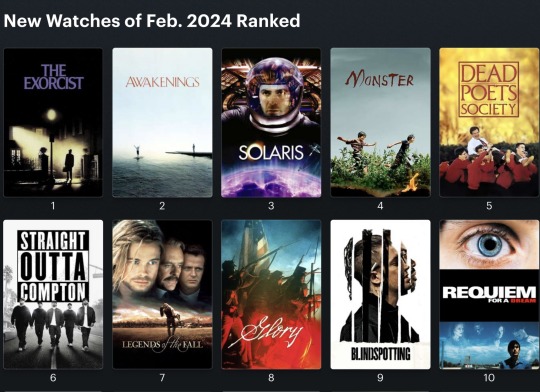

#the exorcist#william friedkin#awakenings#penny marshall#mike leigh#letterboxd#Hirokazu Kore-eda#straight outta compton#requiem for a dream#Solaris#steven soderbergh#robert altman#the beach bum#harmony korine
0 notes
Text
0 notes
Text
By Jessica Corbett
Common Dreams
April 3, 2024
"This Republican budget is an attack on seniors, veterans, and the middle class," said the House Budget Committee's top Democrat.
U.S. House Budget Committee Democrats on Wednesday released a tool to help Americans understand how a newly unveiled Republican plan to cut Social Security "would hurt families across America."
The panel's Democrats targeted the Republican Study Committee (RSC), which includes around 80% of the chamber's GOP members and last month released a budget proposal for fiscal year 2025 that, according to Social Security Works president Nancy Altman, shows "the Republican Party is the party of cutting Social Security and Medicare, while giving tax handouts to billionaires."
Congressman Brendan Boyle, (D-Pa.), the House Budget Committee's ranking member, said at the time that Republicans had "now gone further than ever with their attacks" on the key programs, noting that their "extreme budget explicitly calls for cutting Social Security benefits for millions of Americans, ending Medicare as we know it, and making trillions in devastating cuts that would raise the cost of living for working families."
"Instead of saving Social Security and Medicare by making billionaires pay their fair share, House Republicans would rather break the sacred promise that every American should be able to retire with dignity. This Republican budget is an attack on seniors, veterans, and the middle class," he added.
Boyle also pledged that President Joe Biden and congressional Democrats "will fight to ensure it never becomes reality."

Nationally, the committee's Democrats warn on the webpage that hosts their new tool, the RSC plan would force "Americans to work longer for less" and "cut Social Security benefits for 257 million people, or 3 in 4 Americans."
The tool enables Americans to see how Republicans' proposal would impact each congressional district. For example, raising the retirement age for Americans 59 and younger would cut Social Security benefits for 620,000, or 80% of people in Pennsylvania's 2nd Congressional District, which Boyle represents. Statewide, it would affect 9.6 million—or 74% of residents.
RSC Chair Kevin Hern represents Oklahoma's 1st Congressional District. The plan would impact 630,000, or 79% of people there, according to the tool. Across the state, 3.1 million—77%—would face cuts.
The tool says that in Louisiana's 4th Congressional District, represented by Republican House Speaker Mike Johnson, 590,000, or 76% of people, would see cuts. The state total would be 3.6 million—also 77%.
The RSC plan for the next fiscal year—which begins in October—followed the release of budget proposals from Biden and House Budget Committee Chair Jodey Arrington (R-Texas), who is leading the fight for a fiscal commission that critics call a "death panel" designed to force through Social Security and Medicare cuts.
Biden, who is seeking reelection this year and expected to face former Republican President Donald Trump, has vowed to "protect and strengthen" the programs. Social Security Works' Altman has praised the president's proposal and warned that "Social Security is on the ballot this November."
38 notes
·
View notes
Text
STS-400: The planned (if needed) rescue of STS-125

Unofficial crew patch *

On LC-39A STS-125 Atlantis (left) and on LC-39B is STS-400 Endeavour (right).
In the wake of the Columbia Tragedy, NASA prepared several contingency missions in the event a shuttle could not return safely. Most of the shuttle missions post STS-107, involved the construction/support of the International Space Station. If there were any instances where the shuttle was deemed unfit to return safely, the crew would stay on the ISS until a relief shuttle could be sent. However, STS-125 Atlantis was to service the Hubble Space Telescope and was not on the same orbital plane as the ISS. The Atlantis wouldn't have enough fuel to reach the station, so another Shuttle (Endeavour) was kept on standby on LC-39B. STS-400 would have been crewed by Christopher Ferguson, Eric A. Boe, Robert S. Kimbrough and Stephen G. Bowen.

On the first day, the crew of Atlantis would use the Canadarm to inspect the bottom of the shuttle for damage to the Thermal Protection System. Had there been any damage deemed unrepairable, the plan was to launch Endeavour 5 days later. Atlantis would be put into powered-down mode to conserve power and consumables.


Endeavour will have Altitude Control with Atlantis serving as a Micro-Meteoroid Orbiting Debris shield.
"On flight day two, Endeavour would have performed the rendezvous and grapple with Atlantis."



Crew locations during EVA-1
"On flight day three, the first EVA would have been performed. During the first EVA, Megan McArthur, Andrew Feustel and John Grunsfeld would have set up a tether between the airlocks. They would have also transferred a large size Extravehicular Mobility Unit (EMU) and, after McArthur had repressurized, transferred McArthur's EMU back to Atlantis. Afterwards they would have repressurized on Endeavour, ending flight day two activities."


Crew locations during EVA-2


Crew locations during EVA-3
"The final two EVA were planned for flight day three. During the first, Grunsfeld would have depressurized on Endeavour in order to assist Gregory Johnson and Michael Massimino in transferring an EMU to Atlantis. He and Johnson would then repressurize on Endeavour, and Massimino would have gone back to Atlantis. He, along with Scott Altman and Michael Good would have taken the rest of the equipment and themselves to Endeavour during the final EVA. They would have been standing by in case the RMS system should malfunction. The damaged orbiter would have been commanded by the ground to deorbit and go through landing procedures over the Pacific, with the impact area being north of Hawaii. On flight day five, Endeavour would have had a full heat shield inspection, and land on flight day eight."
Information from Wikipedia link

STS-400 Middeck Seating
The additional crew members on Endeavour would have been accommodated via additional seats installed on the middeck. The autopilot onboard Atlantis would be used to de-orbit the orbiter tail first, to destroy it over a region north of Hawaii, in the Pacific Ocean.
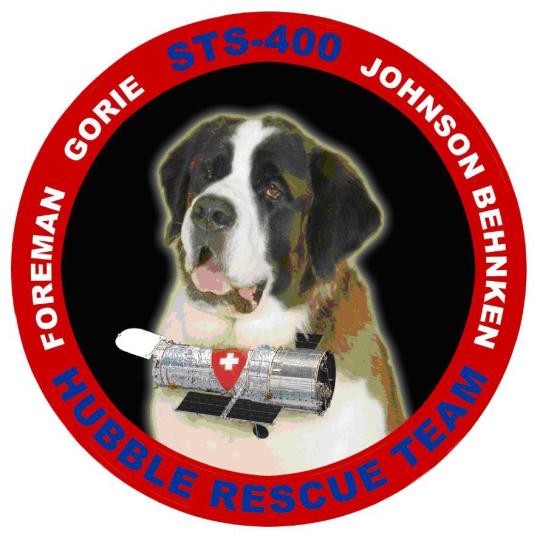
Another unofficial crew patch.

View from LC-39B of the launch of STS-125 Atlantis on May 11, 2009. This was the fifth and final Space Shuttle mission to the Hubble Space Telescope.
Fortunately, STS-400 was not needed and Endeavour was returned to the VAB from LC-39B for STS-127.
* "As a contingency mission, STS-400 was not given official support by NASA for the production of a crew patch or emblem. However this artwork was created for use by the mission team as an unofficial emblem by Mike Okuda [the same person who worked on Star Trek and most of the LCARS], who also illustrated the official patch of STS-125, the flight to be rescued by STS-400."
Date: September 9, 2008
source, source, source, source, source, source, source, source, source, source, source, source, source , source
#STS-400#STS-125#Space Shuttle Atlantis#Atlantis#OV-104#Space Shuttle#Space Shuttle Endeavour#Endeavour#OV-105#Orbiter#NASA#Space Shuttle Program#September#2008#rescue#my post
129 notes
·
View notes
Text
Masterlist
Exactly what the title says :)
Scream-
Sidney Prescott- -Did It For Her Gender Neutral Reader
Tatum Riley-
Randy Meeks- -Dating Randy Meeks Would Include Gender Neutral Reader -Randy Meeks NSFW Alphabet Gender Neutral Reader
Stu Macher-
Billy Loomis-
Mickey Altieri- -Way To Piss Off A Serial Killer Fem Reader -Mickey Altieri NSFW Alphabet Gender Neutral Reader
Roman Bridger-
Jill Roberts-
Sam Carpenter-
Tara Carpenter- -Love In The Face Of Death (Part One) Fem Reader -Love In The Face Of Death (Part Two) Fem Reader
Amber Freeman- -Love her Gender Neutral Reader
Mindy Meeks-Martin-
Chad Meeks-Martin-
Quinn Bailey-
Anika Kayoko- -Lovebug Fem Reader
Wednesday (TV Series)-
Wednesday Addams- -Dating Wednesday Addams Would Include Gender Neutral Reader -Devil Horns? Fem Reader -Axe Wielder (Part One) Fem Reader -Axe Wielder (Part Two) Fem Reader -Watch A Movie With Me? Fem Reader
Enid Sinclair- -Dating Enid Sinclair Would Include Gender Neutral Reader -Quiet Love Male Reader -Stupid Storms Fem Reader -Parents Day Gone Wrong Fem Reader
Yoko Tanaka-
Bianca Barclay-
Yellowjackets-
Lottie Matthews- -Dating Lottie (post and pre crash) hcs Gender neutral
Natalie Scatorccio-
Shauna Shipman-
Jackie Taylor-
Marvel-
Wanda Maximoff-
Natasha Romanoff-
Carol Danvers-
Kate Bishop-
Shameless-
Fiona Gallagher-
Lip Gallagher-
Ian Gallagher-
Debbie Gallagher-
Carl Gallagher-
Mickey Milkovich-
Mandy Milkovich-
Sandy Milkovich-
Young Avengers-
Tommy Shepherd-
Billy Kaplan-
Kate Bishop-
Cassie Lang-
Teddy Altman-
America Chavez-
The Babysitter + The Babysitter Killer Queen-
Cole Johnson-
Bee-
Max
Sonya-
Phoebe Atwell-
The Quarry-
Jacob Custos-
Dylan Leviny-
Emma Mountebank-
Kaitlyn Ka-
Ryan Erzahler-
Laura Kearney-
Max Brinly-
Until Dawn-
Sam Giddings-
Emily Davis-
Mike Munroe-
Ashley Brown-
Jess Riley-
Josh Washington-
Chris Hartley-
Matt Taylor-
Beth Washington-
Hannah Washington-
A Good Girl's Guide to Murder (All three books)-
Pippa Fitz-Amobi-
Ravi Singh-
Cara Ward-
Naomi Ward-
Nat da Silva-
Connor Reynolds-
Jamie Reynolds-
Family Switch-
CC Walker-
-Winter's Feelings Fem Reader
#Masterlist#x reader#x fem reader#x female reader#x male reader#Scream#Scream 1996#Scream 2#Scream 3#Scream 4#Scream 5#Scream 6#Wednesday#Wednesday (Series)#Marvel#Shameless US#Shameless#Young Avengers#The Babysitter#the babysitter: killer queen#The Quarry#Until Dawn#Agggtm#a good girls guide to murder#pippa fitz amobi#ravi singh#cc walker x reader#cc walker#CC Walker x reader#Yellowjackets
43 notes
·
View notes
Text
Aries: Tarantino, F. F. Coppola, Andrea Arnold, Eric Rohmer, Edgar Wright, Ruben Östlund, Josh Safdie, David Lean, Andrei Tarkovsky, Michael Haneke, Martin McDonagh
Taurus: Wes Anderson, Orson Welles, Sofia Coppola, Lars von Trier, Terry Zwigoff, George Lucas, Robert Zemeckis, John Waters, Frank Capra
Gemini: Fassbinder, Hideaki Anno, Makhmalbaf, Agnès Varda, Alex Garland, Clint Eastwood, Yorgos Lanthimos, Aaron Sorkin, Ken Loach, Alexander Sokurov, Giuseppe Tornatore
Cancer: Abbas Kiarostami, Wong Kar-wai, P. T. Anderson, Mike White, Ari Aster, Ingmar Bergman, Krzysztof Kieślowski, Paul Verhoeven, Robert Eggers, Béla Tarr, Mel Brooks, Ken Russell, Sidney Lumet, Kinji Fukasaku
Leo: Alfred Hitchcock, Greta Gerwig, Alain Robbe-grillet, Kubrick, Wes Craven, Taika Waititi, Luca Guadagnino, Christopher Nolan, Polanski, Sam Mendes, Richard Linklater, Nicolas Roeg, James Cameron, Pablo Larraín, M. Night Shyamalan, Iñárritu, Gus Van Sant, Peter Weir, Wim Wenders, Maurice Pialat
Virgo: Tom Ford, Joe Wright, Paul Feig, Dario Argento, David Fincher, Brian De Palma, Baz Luhrmann, Tim Burton, Friedkin, Takashe Miike, Noah Baumbach, Werner Herzog, Elia Kazan, E. Coen
Libra: Julie Dash, Almodóvar, Jacques Tati, Ang Lee, Michelangelo Antonioni, Ti West, Walerian Borowczyk, Nicolas Winding Refn, Satoshi Kon, Kenneth Lonergan, Michael Powell, Jacques Tati, Steve McQueen, Denis Villeneuve
Scorpio: Mike Nichols, Barry Jenkins, Charlie Kaufman, Céline Sciamma, Tsai Ming-liang, Jean Rollin, Scorsese, Louis Malle, Luchino Visconti, François Ozon, Julia Ducournau
Sagittarius: Sion Sono, Cassavetes, Raj Kapoor, Steven Spielberg, Eliza Hittman, Terrence Malick, Ozu, Alfonso Cuarón, Gregg Araki, Larry Charles, Judd Apatow, Kathryn Bigelow, Lenny Abrahamson, J. Coen, Jean Luc Godard, Diane Kurys, Ridley Scott, Lynne Ramsay, Woody Allen, Fritz Lang
Capricorn: Larry Clark, David Lynch, Harmony Korine, Damien Chazelle, David Lowery, Mary Harron, Sergio Leone, Todd Haynes, Pedro Costa, Gaspar, Noe, Fellini, Joseph Losey, Miyazaki, John Carpenter, Steven Soderbergh, Michael Curtiz, John Singleton, Vertov
Aquarius: Jim Jarmusch, John Hughes, Darren Aronofsky, Jodorowski, Michael Mann, Derek Cianfrance, Alex Payne, Truffau, Eisenstein, Tone Hooper
Pisces: Pasolini, Sean Baker, Paul Schrader, Bernardo Bertolucci, Benny Safdie, Jacques Rivette, Bunuel, Luc Besson, David Cronenberg, Spike Lee, Rob Reiner, Mike Mills, Sebastián Lelio, Jordan Peele, Ron Howard, Robert Altman
86 notes
·
View notes
Text
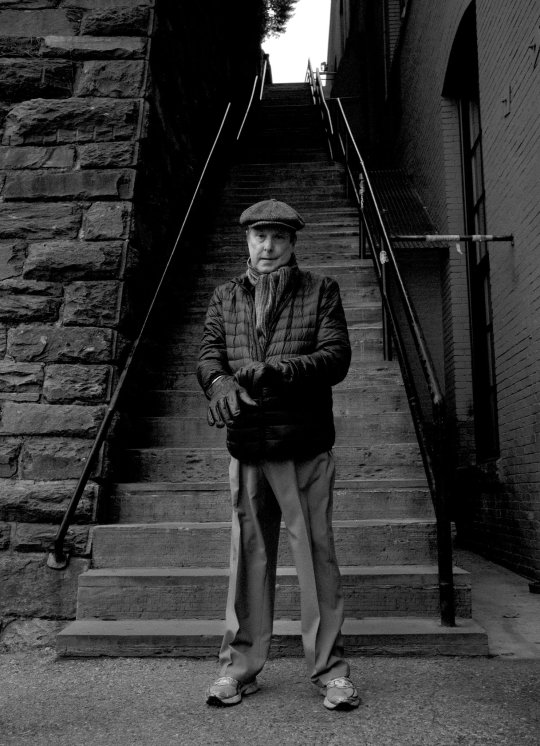
The film director William Friedkin, who has died aged 87, was slightly older than the “movie brats” group (Steven Spielberg, Martin Scorsese and so on) credited with revolutionising US cinema in the late 1960s and early 70s.
Like Robert Altman and Sidney Lumet, Friedkin had come to cinema through TV and documentary, but made a vital contribution to the American new wave. His double-whammy in the first half of the 1970s, The French Connection (1971) and The Exorcist (1973), met with critical acclaim and a level of box-office success that elevated them into pop-culture phenomena. They also managed to overshadow everything else he did.
Nevertheless it would be wrong to characterise his career as a rise and fall. His finest hour was arguably the 1985 cop-and-counterfeiters thriller To Live and Die in LA, while he scored a modest triumph late in the day with his 2011 adaptation of Tracy Letts’s southern-fried noir play Killer Joe. But his steady hand, his timing and his commercial savvy were evident in those early hits. The French Connection, with its preference for hand-held, vérité-style camerawork and on-the-hoof sound recording, sometimes at the expense of intelligibility, took the American policier to a level of authenticity and grittiness to which the genre still aspires today.
Friedkin was never shy of owning up to his mistakes; his 2013 memoir, The Friedkin Connection, opens with an account of various regrettable errors, including passing up the chance to buy an ownership stake in Mike Tyson and throwing away some sketches by the then-unknown artist Jean-Michel Basquiat. To these can be added his reluctance to cast Gene Hackman as The French Connection’s dishevelled antihero, “Popeye” Doyle.
Actor and director fought regularly. “His outbursts [onscreen] were aimed directly at me … more than the drug smugglers.” Among the film’s five Academy Awards was a best actor prize for Hackman’s snarling performance, and one for Friedkin as best director.
The Exorcist followed Roman Polanski’s Rosemary’s Baby (1968) in bestowing upon the modern horror movie a new sheen of class and respectability. Friedkin integrated serious themes with extreme gore and intense terror, but rejected the idea that The Exorcist belonged to the horror genre. “I think it deals with issues far more profound than what you find in the average horror film. To be frank with you, Bill [the writer William Peter Blatty] and I never set out to make a horror film. The idea never crossed our minds. To me, The Exorcist was a story about the mystery of faith, and I tried to depict that as realistically as possible.”
His parents and grandparents had fled Kiev (Kyiv) in the early 1900s, making the passage to the US by hiding on freighter ships. William was born and raised in Chicago, the son of Rachel (nee Green), who gave up her job as an operating-room nurse when he was born, and Louis, a former semi-professional softball player turned cigar maker and men’s clothing salesman. Friedkin characterised his own adolescence as one of frustration and thwarted dreams: “From an early age, my ambitions overwhelmed my abilities,” he wrote. “It’s a miracle I didn’t end up in jail or on the streets.”
He graduated from Senn high school in 1953 and got a job in the post-room of a local Chicago television station, WGN-TV. He worked his way up through various positions, acting as floor manager on several hundred shows before a vacancy opened for a director of live drama.
But it was a cinematic experience around the same time that proved formative. One afternoon in the early 60s, Friedkin went to see Orson Welles’s Citizen Kane for the first time, entering the cinema at noon and not leaving until late that evening, having watched the movie five times back-to-back: “No film I’ve seen before or since meant so much to me. I thought, ‘Whatever that is, that’s what I want to do…’ On that Saturday, just three years younger than Welles when he created Kane, I resolved to become a film-maker.”
In 1962, he made The People vs Paul Crump, an award-winning documentary about a man on death row, and also directed an episode of The Alfred Hitchcock Hour, before knocking out four features: Good Times (1965), a vehicle for the musical duo Sonny & Cher; the comedy The Night They Raided Minsky’s and an intermittently electrifying screen version of Harold Pinter’s The Birthday Party (both 1968); and another theatre adaptation, The Boys in the Band (1970), about a group of gay friends.
In his 1998 book Easy Riders, Raging Bulls, the film historian Peter Biskind wrote that on the basis of those last two films, Friedkin had acquired a “reputation for being an art film director, the kiss of death. He was depressed, afraid he would never work again.”
Salvation came in the shape of a screenplay adapted from a factual bestseller about the NYPD’s campaign to smash a drug ring. Friedkin brought an unprecedented level of realism to The French Connection. A key sequence, thrillingly executed by Friedkin, features a seven-minute chase through Brooklyn, with Popeye (in a stolen car) trying to outrun and intercept his quarry, who has hijacked the train speeding along the elevated track above him.
Friedkin was not bashful about his Oscar win: Biskind reported that the director had his chair on the set of The Exorcist emblazoned with the words “An Oscar for The French Connection”. His behaviour had also become harsher and unrulier, even if there was usually a method to his madness (such as slapping a real priest, who had been hired to play an absolution scene, in order to produce the required nervous energy).
The Exorcist was a calculating combination of the portentous and the shrill, mixing highfalutin religious inquiry with brazenly shocking scenes showing Regan (played by the 13-year-old Linda Blair) masturbating with a crucifix, growling obscenities and projectile vomiting. Friedkin’s grasp of tone was sure, though the movie sometimes seemed to be in denial about its own carnivalesque tactics.
These two defining peaks of Friedkin’s career were followed in 1977 by his most conspicuous commercial flop: Sorcerer, a thriller about four men driving a combustible cargo of dynamite through the rainforest. It was based on the same source material as Henri-Georges Clouzot’s masterpiece The Wages of Fear, and while not in the same league it was nonetheless undeserving of its box-office fate.
Various factors were blamed, ranging from Friedkin’s hubris to a release date adjacent to Star Wars. It would not be until a remastered print of Sorcerer was screened at the Venice film festival in 2013 that it would begin to lose its unwarranted taint of failure. He insisted it was the work of his which remained closest to his original vision: “The way I saw the film in my mind’s eye, that is the one that’s pretty much there.”
His usual bluster was absent from his next film, the low-key comedy-thriller The Brink’s Job (1978), a dramatisation of the $3m Brink’s robbery in Boston, which Friedkin made when his proposed film of Born on the Fourth of July (later shot by Oliver Stone) fell through.
The mixture of sensational subject matter and po-faced tone that had served him so well on The Exorcist did not prove so successful with Cruising (1980), a lurid and occasionally objectionable thriller starring Al Pacino as a cop who goes undercover in the gay S&M subculture to catch a murderer.
An early draft of the script had been leaked, prompting an onslaught of objections from the gay press, and by the time the film emerged heavily trimmed by the censor’s scissors, it was something of a tarnished cause célèbre. Though Cruising is more complex and conflicted than some of its detractors would allow, it looks unlikely to undergo the same critical rehabilitation as Sorcerer.
To Live and Die in LA showed that not only had Friedkin’s French Connection-era knack for dynamic action sequences not deserted him, but he could combine it with a slicker, stylised aesthetic. The rest of the 80s, however, was not a fertile time for him. He made Deal of the Century (1983), a listless comedy about the arms race, the TV movie C.A.T. Squad (1986) and the thriller Rampage (1987), which he adapted himself from William P Wood’s book.
The Guardian (1990) returned him to the horror genre. Blue Chips (1994), a drama about the politics of college basketball, was subtle and powerful, with an uncompromising lead performance by Nick Nolte, but it foundered commercially (it went straight to video in the UK). The thriller Jade (1995) earned some notoriety when its extravagantly paid screenwriter Joe Eszterhas complained of the changes made to his script; Friedkin, who was responsible for the rewrites, later named it as his favourite of his own movies.
Rules of Engagement (2000) was a mediocre drama with reactionary overtones, about a court-martial following the massacre of civilians in Yemen. The star of that film, Tommy Lee Jones, was reunited with the director in another thriller, The Hunted (2003). But Friedkin found new momentum of sorts in two adaptations of claustrophobic thrillers by Letts – Bug (2006) and Killer Joe.
In 2013, he returned to Pinter’s The Birthday Party, directing the play for the stage in Los Angeles, with Tim Roth and Steven Berkoff among the cast. However, this was postponed at the 11th hour when Friedkin decided to replace Berkoff in the part of the intimidating inquisitor Goldberg (though Berkoff claimed to have resigned). The production did not find a replacement and was never staged.
In 2018, he was the subject of Friedkin Uncut, which combed through his career and featured interviews with collaborators, celebrity fans and the director himself, who is heard confirming that he only ever asks for one or two takes: “I’m not looking for perfection,” he says.
His final films were The Devil and Father Amorth (2017), a documentary about a real-life exorcist, and The Caine Mutiny Court-Martial (2023), an updated adaptation of the Herman Wouk novel first filmed in 1954, starring Kiefer Sutherland. It will premiere next month at the Venice film festival, where the director was honoured in 2013 with a lifetime achievement award.
Friedkin’s reputation as bullish extended to all areas of his life and work. As an interviewee he was comically blunt. Responding to an Independent journalist who complained that the prologue to The Exorcist was baffling, he said: “I don’t have to explain it. You’re free to think of it, or to dismiss it, in any way that you want. It’s called mystery … Jackie Collins writes crisp narrative. I suggest you read all of her books. You will never be in doubt about where the story is going.”
And he rebuffed a Guardian reporter’s suggestion that he subscribed to the auteur theory, which prizes the director as the ultimate author of a film: “Didn’t you hear what I said? Am I talking to deaf ears? No! No! ... The auteur theory is a load of bollocks!”
His first three marriages ended in divorce: that to the actor Jeanne Moreau lasted from 1977 to 1979; that to another actor, Lesley-Anne Down, from 1982 to 1985; and that to the journalist Kelly Lange from 1987 to 1990. The following year he married the former chief executive of Paramount, Sherry Lansing.
She survives him, along with a son, Cedric, from a relationship with Jennifer Nairn-Smith, and a son, Jack (Jackson), from his second marriage.
🔔 William Friedkin, film director, producer and screenwriter, born 29 August 1935; died 7 August 2023
Daily inspiration. Discover more photos at Just for Books…?
21 notes
·
View notes
Text
Hmm. Ahead of my birthday I was looking at a list of people also born on the 20th of February and it’s a very varied crop. I already knew about Anthony Head and Dame Gillian Lynne, as well as Rihanna and ex-Prime Minister Gordon Brown, but I’d completely forgotten that I also share it with Cindy Crawford, Sidney Poitier, Ian Brown of the Stone Roses, Kurt Cobain, actresses Brenda Blethyn and Imogen Stubbs, plus directors Mike Leigh and Robert Altman. Oh, and Ivana Trump. 🫤
A bit of a mixed bag there!
#there are also a lot of younger people i’ve never heard of#as well as an illegitimate daughter of georgiana duchess of devonshire and the eldest daughter of edward vii#but not david garrick as for some reason i’d thought#he’s tomorrow
5 notes
·
View notes
Text
‘M*A*S*H’ at 50: War Is Hell(arious)
Five decades ago, “M*A*S*H” anticipated today’s TV dramedies, showing that a great comedy could be more than just funny.

“M*A*S*H,” which debuted in September 1972, feels both ancient and current. With Jamie Farr, seated, and, from left, Mike Farrell, David Ogden Stiers, Alan Alda, Loretta Swit, Harry Morgan and William Christopher in a later season.Credit...CBS Photo Archive/Getty Images
By James Poniewozik
Sept. 16, 2022 Updated 10:59 a.m. ET
The pilot episode of “M*A*S*H,” which aired on Sept. 17, 1972, on CBS, lets you know immediately where and when you are. Sort of. “KOREA 1950,” the opening titles read. “A HUNDRED YEARS AGO.”
The Korean War could indeed seem a century away from 1972, separated by a gulf of cultural change and social upheaval. But as a subject, it was also entirely current, given that America was then fighting another bloody war, in Vietnam. The covert operation “M*A*S*H” pulled off was to deliver a timely satire camouflaged as a period comedy.
The year before, CBS had premiered Norman Lear’s “All in the Family,” a battlefield dispatch from an American living room. But “M*A*S*H” was another level of escalation, sending up the lunacy of war even as Walter Cronkite was still reading the news about it. The caption acknowledged the risk by winking at it: Who, us, making topical commentary?
Today, “M*A*S*H” also feels both like ancient history and entirely current, but for different reasons.
On the one hand, in an era that’s saturated with pop-culture nostalgia yet rarely looks back further than “The Sopranos” or maybe “Seinfeld,” “M*A*S*H” is often AWOL from discussions of TV history. Sure, we know it as a title and a statistic: The 106 million viewers for its 1983 finale is a number unlikely to be equaled by any TV show not involving a kickoff. But it also gets lost in the distant pre-cable mists, treated as a relic of a time with a bygone mass-market TV audience and different (sometimes cringeworthy) social attitudes.
Yet rewatched from 50 years’ distance, “M*A*S*H” is in some ways the most contemporary of its contemporaries. Its blend of madcap comedy and pitch-dark drama — the laughs amplifying the serious stakes, and vice versa — is recognizable in today’s dramedies, from “Better Things” to “Barry,” that work in the DMZ between laughter and sadness.
For 11 seasons, “M*A*S*H” held down that territory, proving that funny is not the opposite of serious.

Alda’s Hawkeye was a forerunner of the modern dramedy antihero.Credit...CBS Photo Archive/Getty Images
Off the beaten laugh track
The characters serving in the 4077th Mobile Army Surgical Hospital in Korea were professionals whose vocation was to save lives. But their assignment was to patch up soldiers so that they could return to the front lines and kill other people or get killed themselves. This was the eternal, laugh-till-you-cry joke of “M*A*S*H.”
“M*A*S*H” stepped into, and outside of, a tradition of military sitcoms. “Gomer Pyle, U.S.M.C.” and “The Phil Silvers Show” poked fun at the hardships and hustles of life in uniform; “Hogan’s Heroes,” which preceded “M*A*S*H” from 1965 to 1971 on CBS, was about shenanigans in a Nazi P.O.W. camp. But as for the abominations of war, these sitcoms, like the bumbling Sgt. Schultz of “Hogan’s,” saw nothing.
Only three years earlier, CBS had canceled the successful “Smothers Brothers Comedy Hour” amid controversy over its antiwar stances. But by the early 1970s, even die-hard anticommunists saw Vietnam as a lost cause. Pop culture was changing, too, as evidenced by the success of “All in the Family” and of Robert Altman’s 1970 film “M*A*S*H,” based on a novel by Richard Hooker (the pseudonym of H. Richard Hornberger).
The show’s creators, Larry Gelbart and Gene Reynolds, imagined a version of the story that was more pointedly political than Altman’s dark-comic film, and certainly more so than Hooker’s cheerfully raunchy book.
The staff of the 4077th, mostly draftees, channeled their frustration with their situation into pranks, drinking, adultery and gallows humor. The insubordinate-in-chief was Capt. Benjamin Franklin “Hawkeye” Pierce (Alan Alda), who was dead-serious about surgery and dead-sarcastic about every other aspect of the wartime experience.
Casting Alda as the ensemble’s moral center and chaos agent was key. He could caper on set like the love child of Bugs Bunny and Groucho Marx (Hawkeye would imitate the latter while making rounds with patients). He gave Hawkeye’s flirtations with nurses a bantering lightness (though from a half-century’s distance, they can come across more like straight-up harassment).
But Alda also conveyed Hawkeye’s exhausted spleen, which the doctor poured into letters to his father in Maine, a frequent episode-framing device: “We work fast and we’re not dainty,” he writes in the pilot. “We try to play par surgery on this course. Par is a live patient.”
“M*A*S*H” borrowed bits from its sitcom predecessors. It was a workplace comedy, with a goofy boss, Lt. Col. Henry Blake (McLean Stevenson), and uptight antagonists, like the gung-ho lovers Maj. Frank Burns (Larry Linville) and Maj. Margaret “Hot Lips” Houlihan (Loretta Swit). The staff wrestled with bureaucracy and gamed the system, as when the hyperefficient company clerk, Cpl. Walter “Radar” O’Reilly (Gary Burghoff) mailed a jeep home one part at a time.
But the zaniness came with constant reminders that the realities of war could intrude at any moment, like the incoming choppers ferrying the wounded. The producers pushed CBS to dump the laugh track — what’s a studio audience doing in the middle of a war zone? — and eventually compromised on shutting off the yuk machine during operating-room scenes.
The show earned its belly laughs and its quiet. Even the sitcom-standard high jinks — dealing with the black market for medicine, inventing a fictional officer in order to donate his pay to an orphanage — were forms of protest.
In Season 1’s “Sometimes You Hear the Bullet,” Hawkeye meets a writer friend, doing research on the war, who later turns up on the operating table with a mortal wound. The executive producer Burt Metcalfe told the Hollywood Reporter that a CBS executive said, at the end of the season, that the episode “ruined ‘M*A*S*H.’”
The show would run for another 10 years.
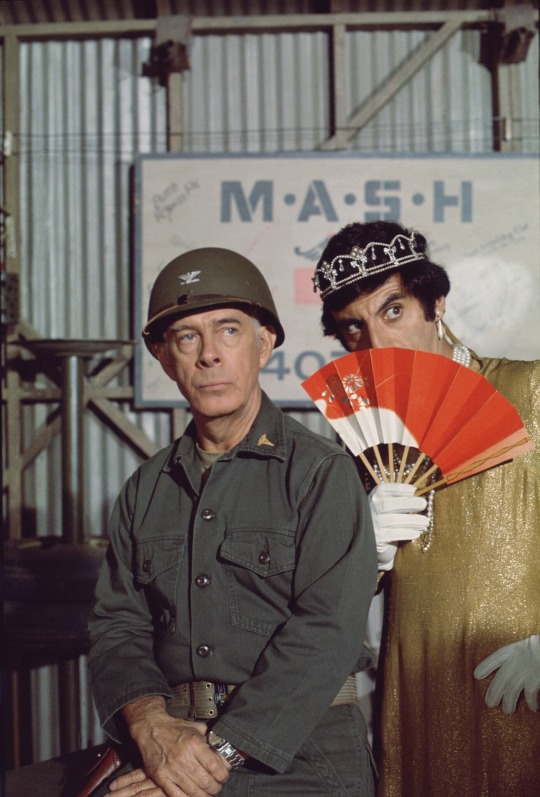
“M*A*S*H” shows its age in various ways, including in a subplot in which Farr’s Klinger sought discharge from the Army by dressing in women’s clothes.Credit...CBS Photo Archive/Getty Images
Comedy meets dramedy
“From any angle, ‘M*A*S*H’ is the season’s most interesting new entry,” the critic John J. O’Connor wrote in The Times in September 1972. Audiences came around in Season 2, after CBS moved the show to a better time slot. It spent most of the next decade in the ratings Top 10 (even as its own timeline hopscotched among different points from 1950 to 1953).
The early seasons worked in a vein of joke-heavy dark comedy, branching out into more story forms and social issues. A Season 2 episode involved a gay patient, decades before Don’t Ask Don’t Tell, who had been beaten up by other soldiers in his unit. (“M*A*S*H” had its share of gay-tinged jokes — as well as a long-running subplot about Jamie Farr’s Cpl. Max Klinger trying to win a discharge by dressing as a woman — but they usually played as banter rather than gay panic.)
Then, in the Season 3 finale, the series exploded a land mine. Stevenson had signed a deal with NBC, and Henry was written off in affectionate sitcom style, with goodbyes and a party. In the episode’s closing moments, Radar — a farm kid who saw Henry as a father figure — walks into the operating room to read a bulletin: “Lt. Col. Henry Blake’s plane was shot down over the Sea of Japan. It spun in. There were no survivors.”
Henry’s death kicked off the series’s peak era, in which it evolved from a lacerating comedy into something closer to what we would recognize today as dramedy.
The new commanding officer, Col. Sherman Potter, was a career Army man, played by Harry Morgan, once Jack Webb’s stoic sidekick in the revival of “Dragnet.” (Morgan played a crackpot general earlier in “M*A*S*H.”) More competent and less malleable than Henry, Potter had a gravitas befitting a show that was growing in ambition.
The Kafkaesque absurdism deepened, too, as in “The Late Captain Pierce,” in which Hawkeye is declared dead in a bureaucratic mix-up and tries to exit the war on a morgue bus. “I’m tired of death,” he says. “I’m tired to death. If you can’t lick it, join it.”
The experimental episode formats became more daring. “Point of View” is shot from the vantage of a wounded soldier whose throat injury renders him mute. In a repeated format, a reporter visits the 4077th for the new medium of television. The unit’s chaplain, Father Francis Mulcahy (William Christopher), described seeing surgeons cut into patients in the winter cold. “Steam rises from the body,” he says. “And the doctor will warm himself over the open wound. Could anyone look on that and not feel changed?”
Just as important, the show evolved its supporting characters, especially Margaret, spoofed as a harpy and sex object in the early seasons. In a Season 5 episode, she vents to her subordinate nurses about the pressures that have made her into the stickler they know. Eventually, she becomes a more complex foil and ally.

Swit and Larry Linville in the first season of “M*A*S*H.” Her character, Margaret, became more complex as the show went on.Credit...CBS Photo Archive/Getty Images
The hilarious but one-dimensional Frank even earns some sympathy before his eventual exit, as Margaret throws him over for a fiancé. He’s replaced by the snobby, intelligent Boston Brahmin Maj. Charles Emerson Winchester (David Ogden Stiers), while Hawkeye’s partner-in-pranks Capt. “Trapper” John McIntyre (Wayne Rogers) makes way for the dry, laid-back family man Capt. B.J. Hunnicutt (Mike Farrell).
Even in the matured version of “M*A*S*H,” a lot has aged badly. A largely male story, it subscribed to the kind of counterculturalism that saw sexual freedom mostly as license for men. For much of the show’s run, various minor nurse characters were so interchangeable that they were repeatedly named “Able” and “Baker” — literally, “A” and “B” in an older version of the military phonetic alphabet.
Ironically, Alda — an outspoken Hollywood feminist and co-star of “Free to Be … You and Me” — became a disparaging shorthand for “sensitive men” among gender reactionaries in the “Real Men Don’t Eat Quiche” era. Late in the show’s run, “M*A*S*H” intermittently interrogated its own attitudes toward women, as in “Inga,” a Season 7 episode with Mariette Hartley as a Swedish doctor whose brilliance Hawkeye finds threatening.
Those later years of “M*A*S*H” could be didactic, and few fans would consider them among its best. The camp got cleaner and the hairstyles suspiciously modern. The show’s heart got as soft and the stories as shaggy as B.J.’s mustache. But the final seasons are interesting as a model for how TV would find ways to tell stories pitched between comedy and drama.
In the movie-length finale, which aired on Feb. 28, 1983, the laugh track, which had been scaled back over the seasons, was gone entirely. And while the scenario — the war finally ended, after three real-life years and 11 TV seasons — yielded the expected sentimental goodbyes and even a wedding, the core story was as dark as any the series had ever done.
Hawkeye is in a psychiatric hospital after a traumatic experience whose repressed memory his psychiatrist, Maj. Sidney Freedman (Allan Arbus), is trying to tease out of him. Hawkeye recalls a carefree day trip to the beach, a bottle being passed around on the bus ride home. Then the booze becomes a plasma bottle; the bus had taken on a group of civilians and wounded soldiers. One Korean woman holds a chicken, whose noises threaten to expose the stopped bus to a passing enemy patrol. Hawkeye urges her to quiet the bird, and she ends up smothering it.
Finally — as you will never forget if you’ve seen the episode — the memory clears: The “chicken” becomes a baby. “You son of a bitch,” Hawkeye says, “Why did you make me remember that?”
Is it melodramatic? Sure. A downer? Of course. It is also, on rewatching, a striking bit of filmmaking for an ’80s sitcom. Hawkeye’s memory unfolds with the uncanny clarity of a dawning nightmare. No music cues you in to the horror; the images just grow more unsettling and the scene more grim. It is, in a way, like the journey of “M*A*S*H” over the years: A romp in the midst of a war zone goes, bit by bit, deeper into night and the heart of darkness.
And 106 million people came along for the ride. A year and a half later, Ronald Reagan, a Cold Warrior who was elected partly on a backlash to post-Vietnam sentiment, won a second term in a landslide. Yet more Americans than voted in that election tuned in to watch a big old liberal antiwar TV show.
After ‘M*A*S*H’
For most of its 11 seasons, “M*A*S*H” was one of TV’s most popular comedies. But its style went mostly unimitated for decades.
It’s not really until the 2000s that you see its heirs emerge. The British version of “The Office” shares its ability to turn from blistering comedy to seriousness. (Stephen Merchant, a creator, has talked about the influence of watching “M*A*S*H” episodes without laugh tracks in Britain.) The mockumentary format of the American “Office” and other comedies hark back to the news-interview episodes (while Dwight Schrute is a kind of Frank Burns of the paper-business wars).
Cable and streaming especially became fertile ground for finding laughs in grim situations. “Rescue Me” made trauma-based comedy in a post-9/11 firehouse, “Getting On” in a hospital geriatric wing. The Netflix prison series “Orange Is the New Black” was as thoroughly female as “M*A*S*H” was dominantly male, but it brought anarchic ensemble humor to a deadly dangerous setting.
In Hawkeye, meanwhile, you can see a forerunner of the modern-day dramedy antihero, charismatic but damaged and driven by anger. As a kid watching “M*A*S*H” reruns religiously, I loved Hawkeye’s rascally wit, his principles and his pranks. (One of my elementary-school music pageants had us sing the theme song, “Suicide Is Painless.” The ’70s were complicated.)
Rewatching episodes as an adult, I enjoy all that still. But he’s also kind of a jerk! He’s self-righteous, attention-seeking, snide and, if you’re on his bad side, a bit of a bully. In a Season 5 episode, Sidney Freedman diagnosed him succinctly: “Anger turned inward is depression. Anger turned sideways is Hawkeye.”
This describes not a few difficult modern dramedy protagonists, human and otherwise. In one of the best episodes of “BoJack Horseman,” built entirely around the self-destructive equine protagonist’s eulogy at a funeral, you can hear the echo of the episode “Hawkeye,” in which Alda’s character, concussed in a jeep crash, spends nearly the full half-hour monologuing manically at a perplexed Korean family, to stave off unconsciousness.
Making serious comedy is a feat of balance, and some might argue that the legacy of “M*A*S*H” was to give sitcoms license to be self-important, unfunny bummers. In a 2009 episode of the TV-biz sendup “30 Rock” — a proponent of the joke-packed school of entertainment if ever there was one — Alda made a tongue-in-cheek version of that critique himself.
Playing the biological father of the NBC executive Jack Donaghy (Alec Baldwin), he witnesses Tracy Jordan (Tracy Morgan), a performer on the sketch-show-within-a-show, crying over the memory of being too “chicken” to dissect a frog in high school, which he’d covered up with a phony story of having been asked by a drug dealer to stab a snitch named “Baby.”
“A guy crying about a chicken and a baby?” Alda’s character says. “I thought this was a comedy show.”
Of course, if you got the joke, it was precisely because “M*A*S*H” did its job. It proved, memorably, that a great comedy could cut deep and leave scars. A half-century later, “M*A*S*H” has had the last laugh, or lack thereof.
153 notes
·
View notes
Text
Ships that have already qualified (read before submitting):
Jude Lizowski/Jonesy Garcia
Tyler Kennedy "TK" Strand/Carlos Reyes
Peter Parker (Spider-Man)/Gwen Stacey
Willow Rosenberg/Winifred "Fred" Burkle
Francine Frensky/Muffy Crosswire
Susan Ivanova/Marcus Cole
Kate Kane (Batwoman)/Renee Montoya
Barry B. Benson/Vanessa Bloome
Jake Peralta/Amy Santiago
Willow Rosenberg/Tara Maclay
Jack Zimmermann/Eric "Bitty" Bittle
Justin "Ransom" Oluransi/Adam "Holster" Birkholtz
Danny/Reuven
Larissa "Lara" Bogdan/Jasmine
Kelsey Pokly/Isabella "Stacks" Alvarado
Rebecca Bunch/Audra Levine
Rebecca Bunch/Greg Serrano
Rebecca Bunch/Nathaniel Plimpton
Samantha "Sam" Manson/Danniel "Danny" Fenton
Bruce Wayne (Batman)/Selina Kyla (Catwoman)
Bruce Wayne (Batman)/Clark Kent (Superman)
Clark Kent (Superman)/Lois Lane
Harley Quinn/Pamela Isley (Poison Ivy)
Barney Guttman/Logan Nguyen
Leah/Chanan
Shay Goldstein/Dominic Yun
Marvin/Whizzer
Trina/Mendel Weisenbachfeld
Perchik/Hodel
Tzeitel/Motel
Monica Gellar/Chandler Bing
Molly McGee/Libby Stein Torres
Rachel Berry/Noah Puckerman
Fiddleford McGucket/Stanford Pines
Cristina Yang/Owen Hunt
Cristina Yang/Preston Burke
Levi Schmidt/Nico Kim
Rose Lalonde/Kanaya Maryam
James Wilson/Gregory House
The Baker and/The Baker's Wife
Kim Possible/Ron Stoppable
The Jewish People/The Shabbat Bride
Alec Hardison/Parker
Max Eisenhardt (Magneto)/Charles Xavier (Professor X)
Steve Rogers (Captain America)/James "Bucky" Barnes
Arnold "Arnie" Roth/Michael Bech
Arnold "Arnie" Roth/Steve Rogers (Captain America)
Billy Kaplan (Wiccan)/Teddy Altman (Hulkling)
Bobby Drake (Iceman)/Hank McCoy (Beast)
Bobby Drake (Iceman)/Johnny Storm (The Human Torch)
Layla El Faouly/Mark Spector (Moon Knight)
Matthew Hawk (Two-Gun Kid II)/Clint Barton (Hawkeye)
Peter Parker (Spider-Man)/Betty Brant
Peter Parker (Spider-Man)/Eugene "Flash" Thompson
Peter Parker (Spider-Man)/ Felicia Hardy
Peter Parker (Spider-Man)/ Harry Osborn
Peter Parker (Spider-Man)/Katherine Anne "Kitty" Pryde
Peter Parker (Spider-Man)/Mary Jane "MJ" Watson
Peter Parker (Spider-Man)/Wade Wilson (Deadpool)
Steve Rogers/Bernadette "Bernie" Rosenthal
Wanda Maximoff/The Vision
Midge Maisel/Susie Myerson
Hal Emmerich (Otacon)/Solid Snake
Casey Goldberg-Calderon/Lunella Lafayette
Fran Fine/Max Sheffield
Ben Gross/Devi Vishwakumar
Winston Schmidt/Cece Parekh
David Jacobs/Jack Kelly
Seth Cohen/Summer Roberts
Scout Touzani/Elias Wyrick
KJ Brandman/Mac Coyle
Lavinia Asimov/Poison Oak
Phineas Flynn/Isabella Garcia-Shapiro
Anon's Mom/Dad
The person reading this & their partner
Jerry Seinfeld/Cosmo Kramer
Simon Lewis/Isabel Lightwood
Danielle/Maya
Bram Greenfeld/Simon Spier
Miryem Mandelstam/The Staryk King
David Rose/Patrick Brewer
James T Kirk/S'chn T'gai Spock
Worf Rozhenko/Jadzia Dax
Kanan Jarrus/Hera Syndulla
Brian Jeeter/Krejjh
Bobby Singer/Rufus Turner
Jonah Simms/Amy Sosa
Reish Lakish/Rabbi Yochanen
King David/Yonatan
Devorah/Barak
Moses/Tzipporah
Ruth/Naomi
Yaakov/The Angel
Rowan Roth/Neil Mcnair
Klaus Hargreeves/Dave Katz
Cecil Palmer/Carlos The Scientist
Josh Lyman/Donna Moss
Little Ash/Uriel
Lucille "Lucy" Kensington/Dr. Edison "Ed" Tucker
Fox Mulder/Dana Scully
Anshel/Avigdor
Alec Hardison/Parker/Eliot Spencer
Wanda Maximoff (The Scarlet Witch)/Jericho Drumm
Bruce Wayne (Batman)/Shondra Kinsolving
Bruce Wayne (Batman)/Talia Al Ghul
Ben Grimm (The Thing)/Alicia Masters
Velma Dinkley/Daphne Blake
Velma Dinkley/Marcie Fleach
Didi Pickles/Stu Pickles
Velma Dinkley/Coco Diablo
Babushka (Tatiana)/Dedushka (Ivan)
Kitty Pryde/Illyana Rasputin
Natasha Romanoff/Wanda Maximoff
Marc Spector (Moon Knight)/Clint Barton (Hawkeye)
Hillel/Shammai
S'chn T'gai Spock/James T Kirk/Dr. Leonard "Bones" McCoy
S'chn T'gai Spock/Dr. Leonard "Bones" McCoy
Frankie Bergstein/Grace Hanson
Annie Edison/Jeff Winger
Maxine Myers/Paula Cohen
Baby Houseman/Johnny Castle
Tevye/Golde
Michael "Mike" Wazowski/Celia Mae
Talmudic couple having gay sex in the attic
Tim Drake/Kon El (Conner Kent)
Violet Baudelaire/Quigley Quagmire
Reuben Kent/Feliks Kaufmann
Anshel/Avigdor/Hadass
Amram/Zelikman
Anshel/Hadass
SUBMISSIONS ARE OPEN UNTIL MAY 8, 2023 @ 12:00 AM EDT
#info#if you have any reasons a ship shouldn't be on this list let me know since I don't have the ability to fully vet everything#there are a small handful im still considering#will update as more submissions trickle in
47 notes
·
View notes
Text
Trouble Every Day (Claire Denis, 2001)
Wings Of Desire (Wim Wenders, 1987)
Sympathy For The Devil (Jean-Luc Godard, 1968)
Dekalog (Krzysztof Kieslowski, 1989)
Russian Ark (Aleksandr Sokurov, 2002)
Tale Of Tales (Yuriy Norshteyn, 1979)
Time Regained (Raoul Ruiz, 1999)
Aguirre, der Zorn Gottes (Werner Herzog, 1972)
Grey Gardens (Albert & David Maysles, Ellen Hovde, Muffie Meyer; 1975)
One From The Heart (Francis Ford Coppola, 1981)
Man With A Movie Camera (Dziga Vertov, 1929)
Dogville (Lars von Trier, 2003)
Sombre (Philippe Grandrieux, 1998)
Cul-de-sac (Roman Polanski, 1966)
Brown Bunny (Vincent Gallo, 2003)
Le feu follet (Louis Malle, 1963)
The Swimmer (Frank Perry, 1968)
A Special Day (Ettore Scola, 1977)
La maman et la putain (Jean Eustache, 1973)
The Battle Of Algiers (Gillo Pontecorvo, 1966)
The Big Lebowski (Joel & Ethan Coen, 1998)
Touch Of Evil (Orson Welles, 1958)
Playtime (Jacques Tati, 1967)
The Long Goodbye (Robert Altman, 1973)
Goodbye, Dragon Inn (Tsai Ming-liang, 2003)
Rashomon (Akira Kurosawa, 1950)
Eternal Sunshine Of The Spotless Mind (Michel Gondry, 2004)
A Summer's Tale (Eric Rohmer,1996)
The Turin Horse (Béla Tarr, Ágnes Hranitzky; 2011)
Baby Doll (Elia Kazan, 1956)
Daisies (Vera Chytilová, 1966)
Unsere Afrikareise (Peter Kubelka, 1966)
Thérèse (Alain Cavalier, 1986)
La jetée (Chris Marker, 1962)
Le gamin au vélo (Jean-Pierre & Luc Dardenne, 2011)
Les 400 coups (François Truffaut, 1959)
The Piano (Jane Campion, 1993)
I'm Not There (Todd Haynes, 2007)
Killer Of Sheep (Charles Burnett, 1978)
The Piano Teacher (Michael Haneke, 2001)
Dead Man (Jim Jarmusch, 1995)
The Women (George Cukor, 1939)
Pickpocket (Robert Bresson, 1959)
Paper Moon (Peter Bogdanovich, 1973)
Don't Look Back (D.A. Pennebaker, 1967)
Little Fugitive (Ray Ashley, Morris Engel, Ruth Orkin; 1953)
Midnight Cowboy (John Schlesinger, 1969)
The Night Of The Hunter (Charles Laughton, 1955)
The Ice Storm (Ang Lee, 1997)
Man On The Moon (Milos Forman, 1999)
Eyes Wide Shut (Stanley Kubrick, 1999)
Enter The Void (Gaspar Noé, 2009)
Snatch (Guy Ritchie, 2000)
The New Land (Jan Troell, 1972)
Los olvidados (Luis Buñuel, 1950)
Border Radio (Allison Anders, Dean Lent, Kurt Voss; 1987)
Vertigo (Alfred Hitchcock, 1958)
The Adventures Of Prince Achmed (Lotte Reiniger, 1926)
Les triplettes de Belleville (Sylvain Chomet, 2003)
Brief Encounter (David Lean, 1945)
Gare du Nord (Jean Rouch, 1965; segment of Paris vu par... )
Vagabond (Agnès Varda, 1985)
Slap Shot (George Roy Hill, 1977)
Le sang d'un poète (Jean Cocteau, 1932)
Breathless (Jim McBride, 1983)
Stop Making Sense (Jonathan Demme, 1984)
Upstream Color (Shane Carruth, 2013)
Saturday Night And Sunday Morning (Karel Reisz, 1960)
Gadjo dilo (Tony Gatlif, 1997)
Rebel Without A Cause (Nicholas Ray, 1955)
A.K.A. Serial Killer (Masao Adachi, 1969)
The King Of Comedy (Martin Scorsese, 1982)
The Hours (Stephen Daldry, 2002)
In A Lonely Place (Nicholas Ray, 1950)
The Honeymoon Killers (Leonard Kastle, 1969)
Meshes Of The Afternoon (Maya Deren, 1943)
When We Were Kings (Leon Gast, 1996)
Broadway Danny Rose (Woody Allen, 1984)
A Woman Under The Influence (John Cassavetes, 1974)
To The Wonder (Terrence Malick, 2012)
Beavis And Butt-head Do America (Mike Judge, 1996)
Araya (Margot Benacerraf, 1959)
Kes (Ken Loach, 1969)
Skammen (Ingmar Bergman, 1968)
Duel (Steven Spielberg, 1971)
The Bridges Of Madison County (Clint Eastwood, 1995)
The Man Who Fell To Earth (Nicolas Roeg, 1976)
Roma città aperta (Roberto Rossellini, 1945)
Diva (Jean-Jacques Beineix, 1981)
Limite (Mario Peixoto, 1931)
The Fountain (Darren Aronofsky, 2006)
La cérémonie (Claude Chabrol, 1995)
The Draughtman's Contract (Peter Greenaway, 1982)
Amour fou (Jessica Hausner, 2014)
Happiness (Todd Solondz, 1998)
Hausu (Nobuhiko Obayashi, 1977)
Before The Devil Knows You're Dead (Sidney Lumet, 2007)
Gomorra (Matteo Garrone, 2008)
The Full Monty (Peter Cattaneo, 1997)
Låt den rätte komma in (Tomas Alfredson, 2008)
9 notes
·
View notes